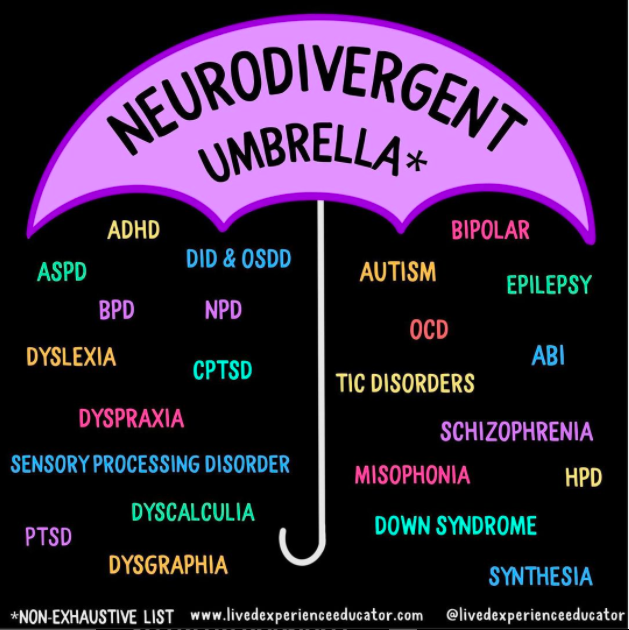In recent years, there has been a growing interest in the concept of neurodiversity, especially within institutions of higher education. As a neurodivergent individual, this sense of curiosity and willingness to support neurodivergent people is encouraging. But in order to support someone, we must understand their needs. And in order to understand their needs, we must listen to them.
Neurodiversity encompasses many neurological differences, including autism, Attention Deficit Hyperactivity Disorder (ADHD), Obsessive-Compulsive Disorder (OCD), Post-Traumatic Stress Disorder (PTSD), epilepsy, learning disabilities, and more. It is important to note that, while much of the language used to describe neurodivergent people still includes words like disorder, neurodiversity as a concept was created to oppose such a deficit-based mindset.

When encountering a new concept like neurodiversity, it can be easy to get overwhelmed, so I’ll use the following analogy to explain neurodiversity in the classroom or workplace:
In a forest, there are countless different types of plants. These plants all have different needs. They need different amounts of water and sunlight. Most, but not all, rely on the help of pollinators. One might prefer to be undisturbed, while another thrives in adversity. All of these plants create relationships with other plants, animals, and fungi in the forest. Without our interference, they find a way to meet their needs. In this analogy, the forest represents the world as a whole, and the many different minds that exist within it.
The classroom or workplace, then, is like a garden. It is cultivated. Seeds are planted with intention. Water and sunlight are provided in controlled amounts. Weeds are pulled. Insects are repelled. Gardeners do what they can to ensure that their plants produce whatever is desired, be it fruits, vegetables, or herbs. Gardeners may have different methods, resources, and experience levels. But a successful gardener is one who understands the plants in their garden.
If a gardener doesn’t take the time to understand the needs of their plants and gives them all the same amount of water and sunlight, they may unintentionally overwater a particular plant, or allow another to get scorched by the sun. Different plants have different needs. We don’t fault cucumbers for needing lots of water. We don’t fault carrots for needing a colder climate. Why, then, would we fault a student for needing more time on an exam, or an employee for needing a quiet work environment or noise cancelling headphones?
Being a good gardener—in other words, a good supervisor, educator, classmate, or coworker—means asking questions and listening with an open mind. It means understanding that no two minds are the same. We all have different needs, and we thrive when those needs are met.
Accommodations are one possible way of meeting a neurodivergent individual’s needs, but acquiring such accommodations can be challenging. The first step of the process is to receive a diagnosis, which isn’t an option for everyone. And even if an individual has a diagnosis, the remaining steps in the process might confuse or frustrate them to the point of giving up entirely. That isn’t to say we shouldn’t continue to support such accommodations processes. My suggestion is that we deepen the conversation to include accessibility as well as accommodation.
Accessibility is about being proactive rather than reactive. Making something accessible might take a little time in the beginning, but think of the time that will be saved—supervisors and educators will save time responding to fewer accommodations requests, and neurodivergent individuals will save time making such requests. Not only that, but they’ll feel more valued knowing that their needs weren’t an afterthought.
If you don’t know where to start in terms of making your workplace or classroom more accessible, here are a few resources:
- Neurodiversity Network
- EARN (Employer Assistance and Resource Network on Disability Inclusion)
- Universal Design
- Universal Design for Learning
These resources provide valuable information, but there’s always more to learn. Neurodiversity is a complicated concept. An autistic person and a person with a learning disability are both neurodivergent, but have very different needs. Remember to ask questions and listen with an open mind to whatever the individual tells you. Trust that they are the expert on their own lived experience.
